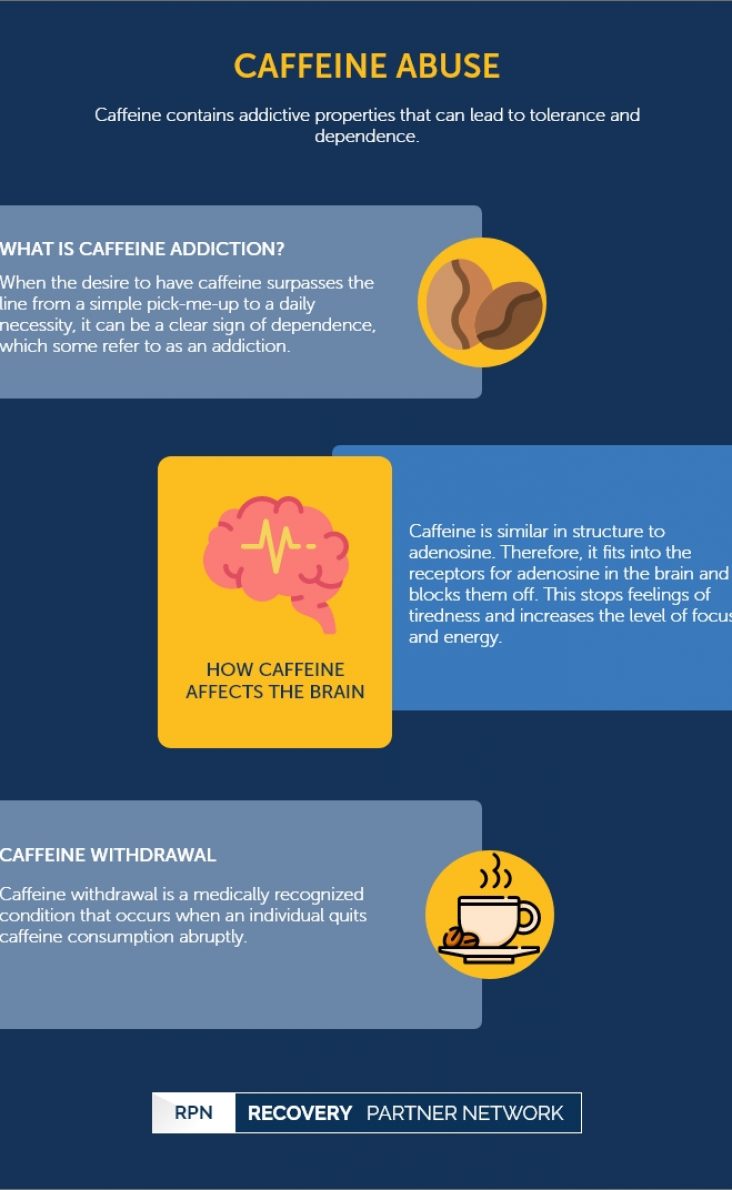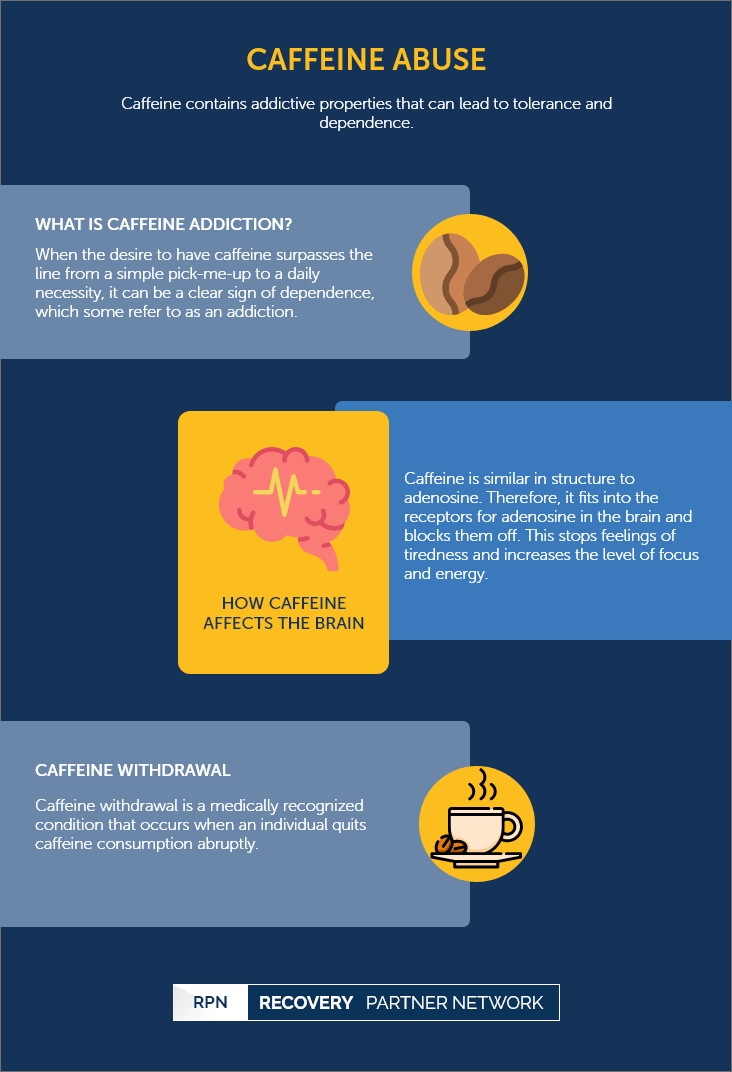Caffeine contains addictive properties that can lead to tolerance and dependence.
Caffeine Abuse
Caffeine addiction | Table of Contents
What is Caffeine Addiction?
Caffeine is regarded as a central nervous system stimulant that enhances concentration, metabolism, and mood. Many individuals have this inexplicable need for caffeine in the morning to boost alertness and motivation, with more than 90 percent of American adults regularly consuming an average of 200mg of caffeine per day (equivalent to two 6-ounce coffees or five 12-ounce cans of soft drinks). Such consumption of caffeine is generally safe and harmless. However, when the desire to have caffeine surpasses the line from a simple pick-me-up to a daily necessity, it can be a clear sign of dependence, which some refer to as an addiction.
Individuals can form a dependence on coffee and other caffeinated beverages rather quickly due to the chemical changes that occur with sustained consumption. When an individual consumes caffeine regularly, he/she would eventually form a tolerance to the substance and require more of it to attain the desired alertness or “caffeine fix.” As such, when the individual discontinues caffeine consumption after prolonged use, he/she will encounter withdrawal symptoms and intense cravings for the substance, making it difficult to quit caffeine despite the health complications associated with it.
FAQ
- How addictive is caffeine?
- Is caffeine bad for you?
- Is it bad to have coffee every day?
- Is coffee a fat burner?
Caffeine does not cause the severity of withdrawal or harmful drug-seeking behaviors as drugs or alcohol. For this reason, experts do not consider caffeine dependence an addiction.
Caffeine increases blood pressure and heart rate, which can affect an individual’s overall health.
Like any other nutrient component, too much caffeine can cause issues in the system. Mostly in the digestive tract. However, it is safe to drink around 8 ounces of coffee per day.
Caffeine causes short term fat burning effects as it boosts the metabolic rate. However, long term use of caffeine can cause the build-up of tolerance to this effect.
The Controversy Surrounding Caffeine Addiction
Although caffeine dependence is quite similar to other drug addictions, some health care officials are reluctant to qualify caffeine dependence as an actual addiction. This is mainly because other addictive substances such as amphetamines and cocaine stimulate the reward and motivation region of the brain to a greater extent than caffeine: although caffeine delivers a surge of dopamine to the brain, it is not great enough to influence the brain’s reward system like other drugs. Thus, theAmerican Psychiatric Association (APA) does not recognize caffeine addiction as a substance use disorder but regards caffeine withdrawal as a clinical condition. However, the World Health Organization (WHO) was the first medical institute in 2012 to formally recognize caffeine addiction as a clinical disorder.
How Caffeine Affects the Brain
Caffeine is mainly addictive due to its ability to influence the human brain and produce feelings of alertness. As soon as caffeine is consumed, it is absorbed via the small intestine and dissolved into the bloodstream. Caffeine then penetrates the blood-brain barrier and enters the brain as it is both water- and fat-soluble.
Caffeine is remarkably similar in structure to a molecule naturally present in the brain called adenosine, so much so that it can easily fit into the receptors for adenosine in the brain and block them off. Generally, the adenosine produced by the brain overtime is locked into the receptors to produce feelings of tiredness. However, when caffeine molecules block these receptors, they stop feelings of tiredness from transpiring and, instead, produce feelings of focus and energy until the caffeine is completely metabolized. In addition, some of the brain’s natural stimulants, such as dopamine, also increase and work effectively when adenosine receptors are blocked. Adrenal glands also start secreting more adrenaline, another stimulant, with the surplus of adenosine, further enhancing alertness and reducing feelings of tiredness.
The brain’s chemical and physical characteristics take a dramatic shift in individuals who consume caffeine regularly. With regular caffeine consumption, brain cells may start developing more adenosine receptors to maintain equilibrium. This will inadvertently result in caffeine tolerance, as more caffeine is needed to block the growing proportion of adenosine to achieve the desired effects.
FAQ
- What causes coffee dependence?
- How much caffeine a day causes dependence?
- What are the effects of caffeine?
- What are the negative side effects of caffeine?
- Why you shouldn't drink caffeine?
Caffeine structurally resembles the adenosine molecule, which is produced by the brain to generate a feeling of tiredness. Caffeine blocks off these molecules and binds to their receptors. This gives an individual a sense of increased alertness and energy. When adenosine receptors are blocked, the adrenal gland receives a cue to secrete adrenaline and, therefore, further enhancing alertness and energy.
Research has shown that people who consume around 100 mg (one cup of coffee) a day can end up developing a dependence on coffee.
As a central nervous system stimulant, caffeine can trigger alertness in an individual once it reaches the brain. A person feels less tired and more awake when they consume caffeine.
There are many negative side effects associated with caffeine consumption, such as increased heart rate, insomnia, stomach irritation, restlessness, nervousness, nausea, vomiting, and increased respiration. Caffeine can also worsen or cause sleep disorders.
Caffeine can stimulate our “fight or flight” hormones, which can cause increased anxiety, heart palpitations, and panic attacks.
Signs of Caffeine Addiction
Caffeine addiction is generally characterized by the substance’s influence on the user’s day-to-day functioning rather than the actual amount of caffeine consumed daily. Furthermore, the severity of the condition is usually assessed by the anguish the user feels when he/she ceases their consumption of caffeine.
The fifth edition of the Diagnostic and Statistical Manual of Mental Disorders (DSM-V) does not consider caffeine addiction as a substance abuse disorder but regards it as a condition that needs further study. According to DSM-V, meeting at least three of the following criteria indicates problematic caffeine consumption:
- Unsuccessful efforts to cut down or limit caffeine use.
- Continued caffeine consumption despite having a persistent or recurrent physical/psychological problem that is likely to have been caused or aggravated by caffeine consumption.
- Withdrawal, in either of the following manners:
- The characteristic withdrawal syndrome for caffeine.
- Caffeine (or a closely related substance) is consumed to reduce or avoid withdrawal symptoms.
- Caffeine being often consumed in larger quantities or for longer than intended.
- Recurrent caffeine use resulting in the failure to fulfill obligations at work, school, or home.
- Tolerance, as characterized by either of the following:
- A need for increasing amounts of caffeine to achieve the desired effect.
- Diminished effect of the same amount of caffeine due to continued use.
- A considerable amount of time spent in activities necessary to obtain, use, or recover from caffeine.
- A strong desire or craving to consume caffeine.
Most experts recommend adults to limit caffeine consumption to no more than 400mg per day (equivalent to four cups of coffee). When this limit is exceeded on a regular basis, individuals may be at risk of negative side effects such as:
- Migraines
- Sleep disruption
- Irritability
- Muscle tremors
- Quickened heartbeat
- Nervousness
- Nausea
Certain individuals may experience the above side effects with even fewer cups, as caffeine tolerance may vary in each individual.
Caffeine Withdrawal
Caffeine withdrawal is a medically recognized condition that occurs when an individual quits caffeine consumption abruptly. The symptoms of caffeine withdrawal usually emerge within a day of quitting and may last anywhere between a week or more.
A few of the symptoms of caffeine withdrawal are:
- Headache
- Irritability
- Fatigue
- Anxiety
- Difficulty concentrating
- Depressed mood
- Tremors
- Low energy
Instead of quitting caffeine cold-turkey, gradually reducing caffeine intake over several weeks can help reduce the severity of withdrawal symptoms to a great extent. The withdrawal and recovery period of caffeine is comparatively shorter than most addictions, with caffeine addiction symptoms resolving within 7 to 12 days of reducing consumption. During this period, the brain will begin to decrease the number of adenosine receptors in each cell as a response to the sudden lack of caffeine. When an individual can successfully reduce caffeine intake until there is none taken, the levels of adenosine receptors in the brain will gradually shrink back to their baseline levels and result in a break in the addiction. Individuals who regularly consume caffeine should make responsible and sound decisions when it comes to caffeine consumption.
FAQ
- What are the symptoms of caffeine withdrawal?
- How do I stop depending on coffee?
- Can you flush caffeine out of your system?
- How long does it take for caffeine to completely clear out of your system?
Effects of caffeine withdrawal include low energy, headache, fatigue, anxiety, difficulty in concentrating, depressed mood, tremors, and irritability.
Gradually reduce your caffeine intake instead of immediately discontinuing caffeine use. Substitute coffee with other drinks.
Once caffeine enters the body, it’s not possible to flush it out of the system; however, there are steps one can take to reduce the effects.
The half-life of caffeine is three to five hours. The rest of the caffeine may remain for much longer in the system.
Recovery Partner Network
We aim to educate and empower. If you feel our library of resources does not cover your specific need, reach out to us, and we would be happy to help.
STATISTICS
© Copyright 2025


